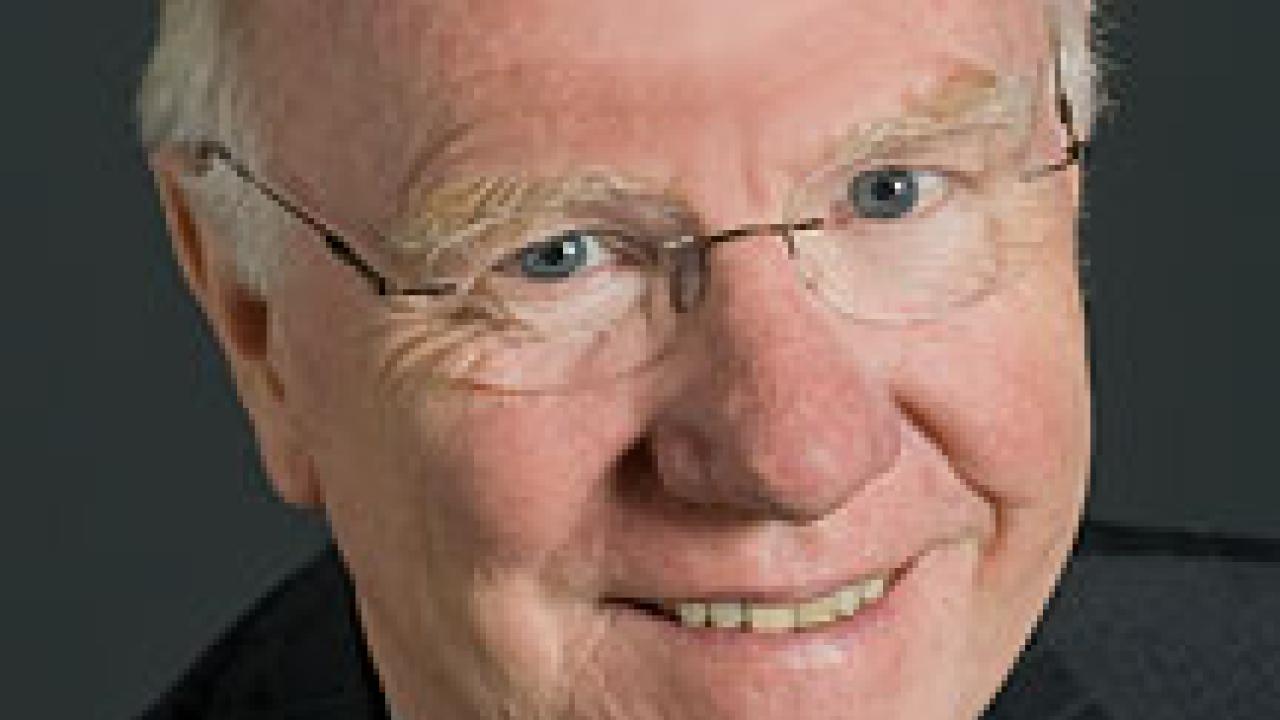The state Public Utilities Commission on Oct. 14 named Chancellor Emeritus Larry Vanderhoef to lead a five-member independent review panel that will investigate the Sept. 9 gas pipeline explosion that killed eight people and destroyed more than three dozen homes in San Bruno.
“I am happy to do it,” Vanderhoef said from his UC Davis office. “This is clearly something that’s very important. It’s also quite clear that what we do will have impact beyond the state.”
PUC President Michael R. Peevey selected the panelists, stating in a news release: “I am extremely pleased that we were able to secure such high-caliber experts and I thank them for their commitment to investigate the San Bruno explosion.
“The panel members represent a wide range of knowledge and experience and all are highly respected in their fields.”
Vanderhoef, who stepped down in 2009 after 15 years as chancellor, said he knew Peevey only from his occasional visits to the campus with Gov. Schwarzenegger. Vanderhoef served 10 years as provost and executive vice chancellor before becoming chancellor.
The chancellor emeritus said he suspects his appointment is related to his experience as the leader of a major research university — and his ability “to absorb lots of information, then make decisions.”
The Public Utilities Commission has directed the panel to conduct a comprehensive study and investigation of the failure of the 30-inch-diameter pipeline, examine the root causes and make recommendations for PUC action to best ensure that such an accident is not repeated elsewhere.
The PUC has given the panel the same investigatory authority as the commission’s staff, and has mandated that PG&E will pay the panel’s expenses.
Vanderhoef said the panel will depend on consultants and experts to gather the technical information about the pipeline blast.
The chancellor emeritus holds a doctorate in plant biochemistry and is a professor in the Department of Plant Biology — but he said his field of study had nothing to do with his appointment to the state panel.
Interestingly, though, at least one biological factor has been raised in the explosion’s aftermath: a phenomenon called microbiologically influenced corrosion, in which bacterial gases break down a pipeline’s wall from the inside. The gases come from microbes that can thrive in stagnant water that may collect in the pipe.
The federal investigation is far from finished. The National Transportation Safety Board released a preliminary report on Oct. 13, offering facts but no analysis.
The report indicates that the NTSB had examined nearly 56 feet of pipeline in three sections (the one that ruptured, and the sections immediately north and south), and that all the pieces "showed fairly uniform wall thickness of 0.36 to 0.38 inches," compared with a measurement of 0.375 inch at the time of construction around 1956.
The San Francisco Chronicle quoted Brigham McCown, a Texas lawyer who once headed the federal Pipeline and Hazardous Materials Safety Administration, as saying: "If you had significant internal corrosion, you would expect that wall thickness to be significantly decreased."
McCown cautioned that corrosion could not be ruled out as a factor in the blast, telling the Chronicle that the damage may have been small and isolated to an area where the pipe failed.
Indeed, the NTSB report indicates that investigators in a Virginia lab were still analyzing the "fracture surfaces" of the ruptured pipe segment.
Vanderhoef said he is not an expert in the science of bacteria that live inside pipelines, but, he added with a smile, "that does have a bit to do with my course — how organisms live everywhere.”
After taking a one-year sabbatical, Vanderhoef is now preparing to return to the classroom, where he will talk biology with nonmajors. This winter, he is scheduled to lead a freshman seminar, Biology for Future Presidents, and in the spring he will teach Biology 10.
The curriculum for the latter, he said, will be unlike previous versions of Bio 10. It will still be for nonmajors, but rather than confine the course to biological concepts, he intends to present the science in terms of today’s issues. “Then we will explore the biology that is needed to understand the issues,” he said.
Another panelist from UC
The appointees to the PUC’s independent review panel include one other academic with UC affiliation — someone who also is a chancellor emeritus: Karl S. Pister, who led the Santa Cruz campus from 1991 to 1996. He received his undergraduate and master’s degrees from UC Berkeley and went on to become an engineering professor there before his appointment as the Santa Cruz chancellor.
Pister is a member of the National Academy of Engineering and the American Association for the Advancement of Science, and a fellow of the American Academy of Arts and Sciences. He is chair of the governing board of the California Council on Science and Technology.
The panel’s other members:
• Patrick Lavin is a union official, serving as an executive council member for the 7th District of the International Brotherhood of Electrical Workers; he is a journeyman lineman by trade and has worked for numerous contractors and four utilities around the United States. He is co-chair of the Energy Task Force of the Pacific Council on International Policy.
• Paula Rosput Reynolds is a business executive, having worked for Safeco Insurance; AGL Resources, an Atlanta-based energy services holding company; and Duke Energy. Earlier in her career, she worked for PG&E Corp., where her management assignments included a stint with PG&E’s interstate natural gas pipeline subsidiary, which is now part of TransCanada Corp.
• Jan Schori is counsel for the Downey Brand law firm in Sacramento, and a former general manager and chief executive officer of the Sacramento Municipal Utility District. She is a member of the governing boards of the North American Electric Reliability Council and Climate Action Reserve, which develops protocols and tracks greenhouse gas reduction projects.
Media Resources
Dave Jones, Dateline, 530-752-6556, dljones@ucdavis.edu
